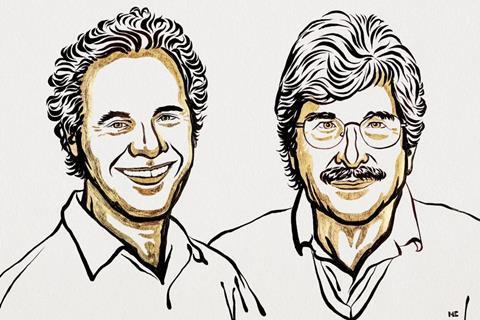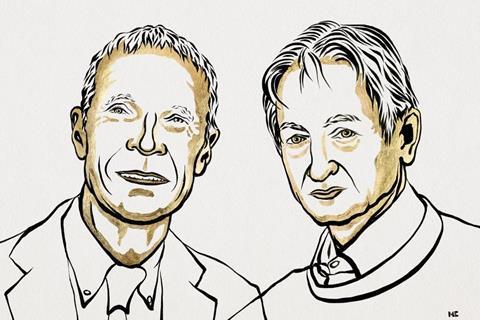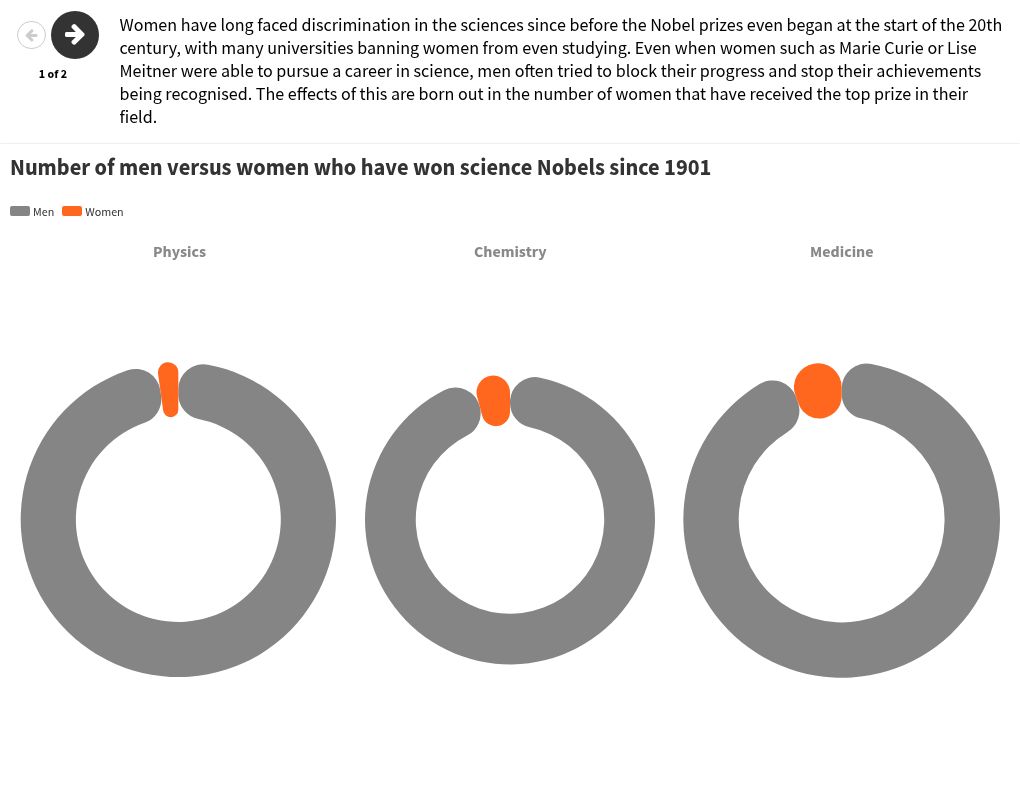8.37am Crystal-ball gazing
At this time in the morning, we always take a look at who’s the hot tip for this year’s chemistry prize. Number crunchers at Clarivate have been looking at which researchers in chemistry are in the top 0.01% when it comes to citations. Their ‘citation laureates’ this year are John Jumper, director of Google DeepMind, Demis Hassabis, chief executive of Google DeepMind, and biochemist David Baker from the University of Washington. They were picked out for their contributions to predicting protein structure. This work led to the creation of AIs, such as RoseTTAFold and AlphaFold, that surprised the world when they were able to provide highly accurate models of proteins when given nothing more than the protein’s sequence of amino acids. Recent work has suggested that these sorts of Ais, however, aren’t able to predict protein folding from first principles but work off of pattern recognition processes.
Other citation laureates tipped for the chemistry prize were physicists Roberto Car, from Princeton University, US, and Michele Parrinello at the Italian Institute of Technology, for their Car–Parrinello molecular dynamics – a computational technique that enables more efficient simulations of molecular dynamics. Kazunari Domen from the University of Tokyo in Japan, was also selected for his work on light-activated catalysts that harness sunlight to drive water-splitting reactions, a key step in producing green hydrogen. Domen’s work has been influential as his group were able to produce photocatalysts that were able to use almost all the light they absorbed to drive water splitting.
Clarivate has previously had success predicting future laureates by looking at citations, with 75 of their citation laureates going on to win an award at some point – though not usually in the year they’re highlighted. So perhaps don’t expect those above to be winners this year. The Nobel committees that make decisions on who wins a prize have been known to wait decades before awarding a prize – the work by John Goodenough that won him the 2019 chemistry Nobel prize for lithium-ion batteries at the age of 97 was done in 1976.
A poll conducted by ChemistryViews received almost 2000 votes on who its readers think is likely to be the next winner of the Nobel prize in chemistry. Half of voters expect it to be an American biochemist, with most expecting it to be another man too. Out of the many named researchers that readers think might win Chi Huey-Wong is the stand out leader with over 200 votes for his work on synthesis of oligonucleotides. Wong won the 2014 Wolf Prize in Chemistry, often a good predictor of future success (we crunched the numbers last years on which awards are indicators of future success in the chemistry prize). Other top tips (with far fewer votes I note) include next generation sequencing pioneer Shankar Balasubramanian, Karl Deisseroth for optogenetics and biomedical engineer Robert Langer.
Eagled-eyed readers will have noticed a paucity of women in the predictions above (Michele Parrinello is a man too). Women continue to be underrepresented at the top levels of science and this plays out in the Nobel prizes won by women.
8.24am Who’s won so far?
Before the chemistry prize is announced, let’s recap who’s won the other science prizes so far. On Monday, Victor Ambros from the University of Massachusetts’ Chan Medical School and Gary Ruvkun from Harvard Medical School won the medicine of physiology Nobel prize ‘for the discovery of a fundamental principle governing how gene activity is regulated’. Ruvkun and Ambros, both students of 2002 medicine laureate Robert Horvitz, discovered that micro RNAs can control the production of proteins and are another, surprising layer of gene regulation. The pair won the Lasker award for basic research in 2008 alongside David Baulcombe for work on microRNAs. Lasker awards are seen as a good predicator of a future win of the physiology or medicine Nobel prize. Lasker award winners who have gone on to win a Nobel prize in recent years include John Gurdon, Tu Youyou and Thomas Südhof.

On Tuesday, the physics prize went to John Hopfield and Geoffery Hinton for their work on artificial neural networks that many of us use every day on our smartphones when making use of AI for picture editing or intelligent searches. Their work has also led to cutting edge scientific tools such as protein structure prediction programs such as RosettaFold and AlphaFold.

Just the chemistry prize left now, excitement is building with just over two hours to wait!
8.14am: Welcome to Chemistry World’s coverage of the Nobel prize in chemistry
Morning all, anything interesting happening today? Thanks for joining us for the most eagerly anticipated annual event in the chemistry calendar – the Nobel prize in chemistry. I will be your guide to all the news and events in the run-up to the announcement of the prize at 11.45 CEST/UTC (10.45 BST) at the earliest. We’ll be tweeting from @ChemistryWorld and you can find us on Facebook and LinkedIn too and find me at @PatDWalter. If you have anything you think we should share on this live page then get in touch below the line in the comments or @-us on Twitter, sorry I mean X. You can also watch the prize announcement live on the Nobel Foundation site (cameras usually turn on around 11.40 CEST/10.40 BST). If you’re on Twitter then you’ll want to follow the hashtag #chemnobel and #nobelprize for all the latest developments. We hope you’ll stay with us over the next couple of hours in the run-up to the announcement as we’ll be posting some analysis of the chemistry prize, looking at who’s tipped to win and some Nobel trivia. We’ll also be running a special all-things-Nobel-prize-related edition of our regular Re:action newsletter later today, rounding up the best of our stories and the rest of the web. Following the prize announcement, we’ll also be running a webinar on Friday afternoon (1500 BST) hosted by business editor Phillip Broadwith. He’ll be joined by special guests to talk about the research that won the chemistry prize this year. You can sign up for free.
